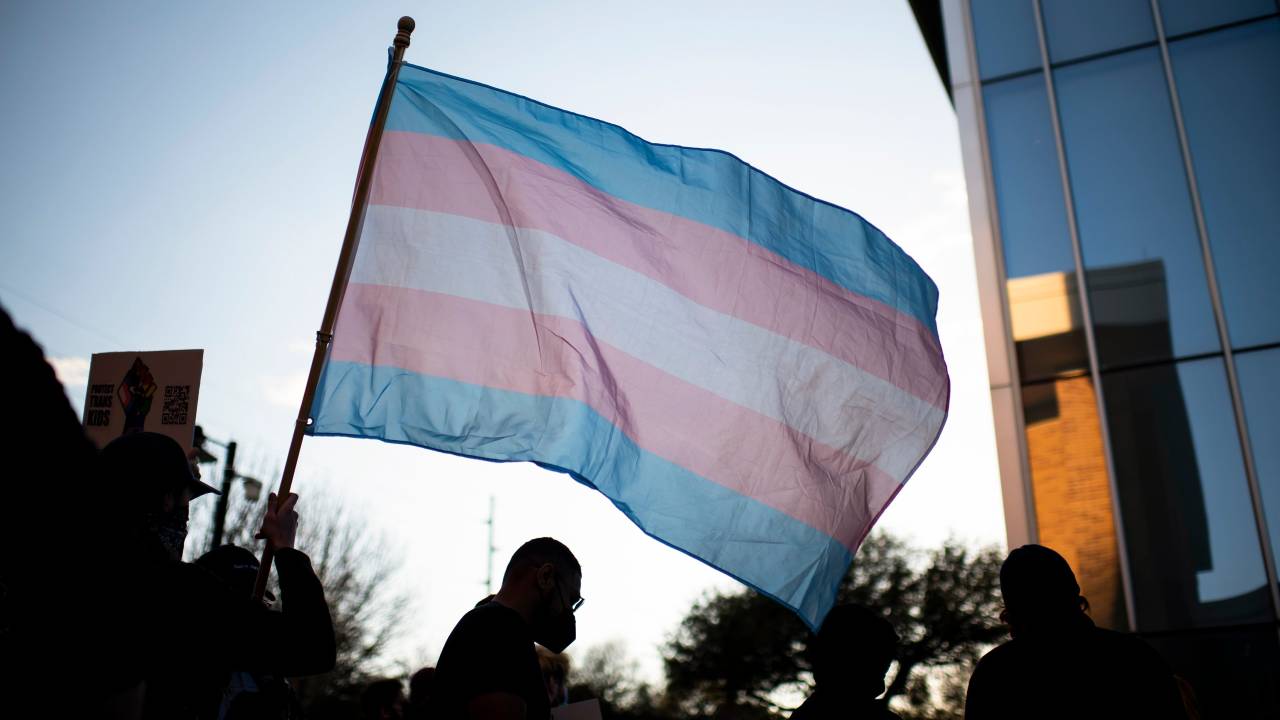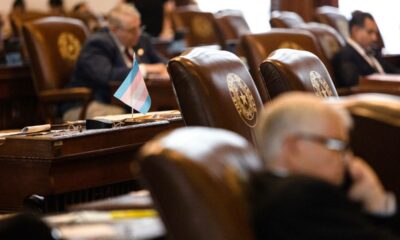88th Texas Legislature
Texas bill advancing in the Senate would block minors from updating gender on birth certificates
Opponents of the bill call it a “power play aimed at making the lives of transgender children as difficult as possible.” The chamber is expected to vote on this legislation Wednesday.

This article originally appeared in The Texas Tribune
 A bill seeking to block transgender and nonbinary Texas youth from updating their birth certificate with their gender identity has received its first approval from the Texas Senate.
A bill seeking to block transgender and nonbinary Texas youth from updating their birth certificate with their gender identity has received its first approval from the Texas Senate.
Senate Bill 162, filed by Republican state Sen. Charles Perry of Lubbock, proposes requiring an individual’s sex assigned at birth to be included on their birth certificate and limiting the circumstances in which this information could be changed for minors. The proposal lists very few exceptions.
“Senate Bill 162 prohibits sex listed on the birth certificate of a minor from being amended unless the change is to correct a clerical error or complete the birth certificate if the sex was not listed at the time of birth or if the child is intersex and the sex is later determined,” Perry said during the Senate meeting.
The Republican-controlled Senate preliminarily passed SB 162 on Tuesday with a vote of 19-11 after hearing no debate. The bill now awaits its final vote from the full chamber before it could advance to the House.
LGBTQ advocates said the legislation would make it impossible for trans and nonbinary Texas youth to update their birth certificate and subsequently other government documents — such as those required for identification for education, traveling and employment — with their gender identity.
“Birth certificates are a foundational document,” Sasha Buchert, a senior attorney with Lambda Legal, testified during the bill’s committee hearing. “And when people have identity documents — especially trans folks — that are inconsistent with who they are, it places them at risk of violence, bullying and even harassment.”
Beyond these dangers, this proposal could interrupt the process of enrolling in school, participating in extracurricular activities and applying for a passport — according to Ash Hall, a policy and advocacy strategist on LGBTQ rights with ACLU Texas who also testified against the bill at its committee hearing.
The process to change a minor’s gender on a birth certificate is lengthy and convoluted, Hall said. Currently, there is no difference in the process for minors and adults requesting a change to the gender marker on a Texas document — such as the sex listed on a birth certificate — according to a guide from the Texas Legal Service Center. The guide recommends that families seek the advice of an attorney for changes to a minor’s gender marker.
A court order is required to change gender markers on Texas documents. The decision to allow or deny a gender marker change resides with local judges, who have discretion over what proof is needed to confirm the change before issuing a court order.
Individuals seeking a gender marker change on their documents then present the court order to make changes to IDs, such as birth certificates or driver’s licenses.
The proposal would essentially erase trans and nonbinary youth from public life, according to the bill’s opponents.
“It’s already really difficult for trans people to update their birth certificates, and the vast majority of trans people are forced to live with inaccurate documents [that don’t] reflect who we are in the first place,” Hall told The Texas Tribune. “It’s deeply unnecessary, and it is only meant to harm.”
Jacqueline Murphy, a trans woman, testified during the committee’s hearing earlier this month that she was able to update her birth certificate as a minor — and that has made it easier for her to acquire identification for college enrollment and employment.
“The benefits for my peace of mind and physical safety cannot be overstated,” she said. “I expect the aim of this bill is to undermine the legitimacy of trans identity as a whole, particularly among children. … This is a power play aimed at making the lives of transgender children as difficult as possible.”
Hall added this bill includes vague language about designating the sex of intersex children. The bill would require those issuing birth certificates to fill in this field for intersex children “whose sex is later determined.” But missing from the legislation, Hall said, is when that determination is made.
“The intersex community, one of the basic rights they’re asking for is that their bodies not be operated on as infants when they can’t consent and that they get the opportunity to decide what their gender is, instead of having one forced upon them,” Hall said. The bill could eliminate the option for intersex children to change the gender initially determined for them.
Meanwhile, SB 162’s supporters said the bill is needed to “protect current laws that we have to actually protect biological sex,” such as existing restrictions in Texas on trans student athletes’ participation at the high school level. Senate Bill 15, which seeks to extend these restrictions to the college level, has also received preliminary approval from the full chamber — and there’s already enough support for the proposal in the House.
“It’s vitally important to know a person’s sex at birth,” said Jonathan Covey, policy director for the conservative group Texas Values. “It’s particularly important in light of fairness in women’s sports competitions.”
The bill’s backers also support Senate Bill 14, which was heard in the same committee hearing as SB 162 and dominated the meeting. SB 14 seeks to block trans kids from accessing transition-related medical treatments such as puberty blockers and hormone therapies. The ban would also include surgeries, though these rarely happen for youth.
SB 14 is also a priority legislation for Lt. Gov. Dan Patrick, who presides over the Senate. The full chamber is expected to discuss and vote on this legislation this week.
William Melhado contributed to this story.
Disclosure: ACLU Texas has been a financial supporter of The Texas Tribune, a nonprofit, nonpartisan news organization that is funded in part by donations from members, foundations and corporate sponsors. Financial supporters play no role in the Tribune’s journalism. Find a complete list of them here.
The Texas Tribune is a nonpartisan, nonprofit media organization that informs Texans — and engages with them – about public policy, politics, government and statewide issues.
88th Texas Legislature
Texas’ ban on certain drag shows is unconstitutional, federal judge says
Senate Bill 12 would have prohibited performers from dancing suggestively or wearing certain prosthetics in front of children. Critics sued the state, saying it violated the First Amendment.

This article originally appeared in The Texas Tribune
 Texas cannot enforce a new law that restricts some public drag shows, a federal judge said Tuesday in declaring the legislation unconstitutional.
Texas cannot enforce a new law that restricts some public drag shows, a federal judge said Tuesday in declaring the legislation unconstitutional.
U.S. District Judge David Hittner found Senate Bill 12 “impermissibly infringes on the First Amendment and chills free speech.” The struck-down law prohibited any performers from dancing suggestively or wearing certain prosthetics in front of children.
Hittner ruled that language discriminated based on viewpoint and is unconstitutionally overbroad and vague.
“The Court sees no way to read the provisions of SB 12 without concluding that a large amount of constitutionally-protected conduct can and will be wrapped up in the enforcement of SB 12,” the ruling reads. “It is not unreasonable to read SB 12 and conclude that activities such as cheerleading, dancing, live theater, and other common public occurrences could possibly become a civil or criminal violation.”
The plaintiffs who sued the state celebrated the order, saying in statements shared by their lawyers that the decision affirmed their rights to express themselves.
“I am relieved and grateful for the court’s ruling,” drag performer Brigitte Bandit said. “My livelihood and community has seen enough hatred and harm from our elected officials. This decision is a much needed reminder that queer Texans belong and we deserve to be heard by our lawmakers.”
Republican state Sen. Bryan Hughes, who authored SB 12, defended the bill and pledged to challenge the ruling. The Texas Attorney General’s Office will appeal the ruling, a spokesperson said.
“Surely we can agree that children should be protected from sexually explicit performances. That’s what Senate Bill 12 is about,” Hughes said. “This is a common sense and completely constitutional law, and we look forward to defending it all the way to the Supreme Court if that’s what it takes.”
Critics of the bill, though, say that Republican lawmakers and officials this year have incorrectly — and unfairly — portrayed all drag performances as inherently sexual or obscene.
While SB 12 was originally billed as legislation that would prevent children from seeing drag shows, the final version did not directly reference people dressing as the opposite gender.
However, Republican leaders, including Gov. Greg Abbott, made it clear that drag shows were the bill’s target — comments and history that Hittner wrote “the court cannot ignore.”
Last month, Hittner temporarily blocked SB 12 from taking effect on Sept. 1 after a two-day hearing for a lawsuit filed against the state by a drag queen and LGBTQ+ groups.
LGBTQ+ Texans, advocates, artists and business groups who sued the state, argued that the law discriminates against the content of performances and restricts equally protected free expression that is protected under the First and 14th Amendments.
In Tuesday’s 56-page ruling, Hittner noted a survey of court decisions “reveals little divergence from the opinion that drag performances are expressive content that is afforded First Amendment protection.”
“Drag shows express a litany of emotions and purposes, from humor and pure entertainment to social commentary on gender roles,” the ruling reads. “There is no doubt that at the bare minimum these performances are meant to be a form of art that is meant to entertain, alone this would warrant some level of First Amendment protection.”
Other states have passed similar legislation restricting drag performance, which have also been struck down by federal courts.
In June, a federal judge in Tennessee, appointed by former President Donald Trump, ruled a law there was unconstitutional in its effort to suppress First Amendment-protected speech.
Bucking that trend, another Texas federal judge last week issued an opinion that supported drag show restrictions.
U.S. District Judge Matthew Kacsmaryk said that West Texas A&M University President Walter Wendler acted within his authority when he canceled a campus drag show. Kacsmaryk wrote that Free Speech jurisprudence had “not clearly established that all ‘drag shows’ are categorically ‘expressive conduct.’”
Hittner acknowledged his Panhandle counterpart’s ruling Tuesday. Hittner pointed to a letter in which Wendler explained his reasoning for banning the show, comparing drag to blackface and a slapstick sideshow.
“The president’s sentiment reinforces this Court’s opinion that while some people may find a performance offensive or morally objectionable, it does not mean the performance is not expressive or given First Amendment protection,” he wrote. “Not all people will like or condone certain performances. This is no different than a person’s opinion on certain comedy or genres of music, but that alone does not strip First Amendment protection.”
LGBTQ+ advocates welcomed Hittner’s decision Tuesday.
“Today’s ruling is a celebration for the LGBTQ community and those who support free expression in the Lone Star State,” GLAAD President and Chief Executive Officer Sarah Kate Ellis. “Texas now joins an increasing number of states whose discriminatory and baseless bans on drag performances are being recognized as unconstitutional and an attack against everyone’s freedoms.”
William Melhado contributed to this story.
The Texas Tribune is a nonpartisan, nonprofit media organization that informs Texans — and engages with them – about public policy, politics, government and statewide issues.
88th Texas Legislature
Federal judge bars Texas from enforcing book rating law
House Bill 900 requires book vendors to rate all their materials based on their depictions or references to sex before selling them to schools. Vendors say the law aims to regulate protected speech with “vague and over broad” terms.

This article originally appeared in The Texas Tribune
 A federal judge said Thursday he will stop a new Texas law aimed at keeping sexually explicit materials off of school library shelves on the eve of the law going into effect, according to state attorneys and lawyers for a group who sued over the proposal.
A federal judge said Thursday he will stop a new Texas law aimed at keeping sexually explicit materials off of school library shelves on the eve of the law going into effect, according to state attorneys and lawyers for a group who sued over the proposal.
District Judge Alan D. Albright indicated during a hearing that he will grant a temporary injunction sought by a group of book groups and sellers, including two Texas bookstores, who sued the state over House Bill 900 in July, the group’s lawyers said in a statement. Albright will issue a written order in one to two weeks; in the meantime, the state cannot enforce the law, according to the statement.
HB 900, which was approved during this year’s regular legislative session, requires school library vendors to rate all their books and materials for appropriateness before selling them to schools based on the presence of sex depictions or references. It also requires vendors to rank materials previously sold to schools and issue a recall for those that are deemed sexually explicit and are in active use by a school.
The plaintiffs argue that the law violates their constitutional rights by targeting protected speech with its broad and vague language. The lawsuit further alleges HB 900 would force plaintiffs to comply with the government’s views, even if they do not agree with them, and that the law operates as prior restraint, which is government action that prohibits speech or other expression before the speech happens. The vendors say it is impossible for them to comply with the rating system because of the sheer volume of materials they would need to review.
The law also calls for creating state school library standards that prohibit sexually explicit materials, requiring parental consent for students to check out materials classified by vendors as “sexually relevant” and giving the Texas Education Agency authority to review a vendor’s rating. If the TEA disagrees with the vendor’s rating and gives it a different one, the vendor must use the agency’s rating. Vendors who do not will be added to a list of vendors that schools cannot buy library materials from.
During the bill’s legislative hearings, librarians and legal experts shared concerns and worries that its language would ensnare books that are not inappropriate and, to the contrary, may be titles important for students whose lived experiences may not be reflected in other literature.
The proposal, from Rep. Jared Patterson, R-Frisco, arrived amid an ongoing debate about what materials are appropriate to be stocked in school and public libraries. Patterson and supporters of such regulations say libraries are infested with inappropriate books that must be vetted and removed.
However, skeptics of that panic and literary advocates counter that the books singled out by politicians often explore sexuality and race, topics that have been swept up in culture-war politics but remain important for youth who may not be comfortable talking about such matters with others.
Despite the concerns, HB 900 sailed through the legislative process before Gov. Greg Abbott signed it in June. It was set to go into effect Friday; however, the law’s language suggests the new requirements won’t have to be fulfilled immediately.
Most, if not all, of the state’s roughly 5.4 million public schoolchildren have already begun the 2023-2024 school year.
The lawsuit’s plaintiffs include two bookstores, Austin’s BookPeople and West Houston’s Blue Willow Bookshop, as well as the American Booksellers Association, the Association of American Publishers, the Authors Guild and the Comic Book Legal Defense Fund.
The Texas Attorney General’s office said Thursday it would move to reverse the injunction and appeal the judge’s decision. The office had not received the judge’s written order or decision by Thursday afternoon, a spokesperson said.
A court representative for Albright did not respond to an inquiry about his comments during Thursday’s hearing, reported by the plaintiffs’ lawyers and on social media by at least one plaintiff.
“We are grateful for the court’s swift action in deciding to enjoin this law, in the process preserving the long-established rights of local communities to set their own standards; protecting the constitutionally protected speech of authors, booksellers, publishers and readers; preventing the state government from unlawfully compelling speech on the part of private citizens; and shielding Texas businesses from the imposition of impossibly onerous conditions,” the plaintiffs said in a joint statement after the hearing. “We look forward to reading the court’s full opinion once it is issued.”
The Texas Tribune is a nonpartisan, nonprofit media organization that informs Texans — and engages with them – about public policy, politics, government and statewide issues.
88th Texas Legislature
Federal judge issues temporary restraining order, says Texas law banning drag shows is “likely” unconstitutional
U.S. District Judge David Hittner heard from LGBTQ+ groups, businesses and a drag performer in a hearing this week, who argued Senate Bill 12 violated their First Amendment rights.

This article originally appeared in The Texas Tribune
 U.S. District Judge David Hittner temporarily blocked a new state law Thursday from going into effect that would have criminalized sexually-oriented performances in front of children or effectively banned some public drag shows.
U.S. District Judge David Hittner temporarily blocked a new state law Thursday from going into effect that would have criminalized sexually-oriented performances in front of children or effectively banned some public drag shows.
LGBTQ+ groups sued the Texas attorney general’s office, hoping to stop authorities from enforcing Senate Bill 12, which was signed by Gov. Greg Abbott in June and was scheduled like most new laws to go into effect Friday.
In a two-day hearing earlier this week in Houston, a drag performer and entertainment businesses said Texas lawmakers’ effort to regulate these shows was an unconstitutional attempt to stifle their freedom of expression. Though Hittner did not issue a final order on Thursday, he found the plaintiffs’ argument compelling.
“Based on evidence and testimony presented at the hearing, the court finds there is substantial likelihood that SB 12 as drafted violated the First Amendment of the United States Constitution under one or more of the legal theories put forward by the plaintiffs,” Hittner wrote in the temporary restraining order.
Hittner said allowing the law to take effect would likely cause “irreparable harm” to the plaintiffs. He issued the restraining order to maintain the status quo of the legal landscape while preparing a final decision — the restraining order does not guarantee a permanent injunction. He said his order could come two to four weeks after the hearing.
Hittner heard testimony earlier this week from LGBTQ+ groups, businesses and a performer, which were plaintiffs in one of two lawsuits against SB 12. They argued the law trampled on their First Amendment rights to perform and organize drag shows. They described drag as a healing, expressive and political form of performance art with historical connections to LGBTQ+ people.
“If allowed to take effect, SB 12 will make our state less free, less fair, and less welcoming for every artist and performer,” said American Civil Liberties Union of Texas Attorney Brian Klosterboer in a statement following the judge’s decision. “This temporary order is a much-needed reprieve for all Texans, especially our LGBTQIA+ and transgender community, who have been relentlessly targeted by our state legislature.”
Defending the law, attorneys with the Texas attorney general’s office said SB 12 was narrowly tailored to protect children from sexually-explicit performances. The new law did not explicitly ban drag shows, lawyers for the state said, and these performances should not be considered expressive or receive First Amendment protections.
However, shortly after signing the law, Abbott shared a story on social media about SB 12’s passage and declared he had banned drag performances in public.
“The people of Texas were appalled to learn of an increasing trend of obscene, sexually explicit so-called ‘drag’ performances being marketed to families with children,” said Paige Willey, the director of communications for the attorney general’s office. “The Office of the Attorney General will pursue all legal remedies possible to aggressively defend SB 12, the state law that regulates such performances to protect children and uphold public decency.”
Under the new law, business owners would have had to face a $10,000 fine for hosting sexually explicit performances in which someone is nude or appeals to the “prurient interest in sex.” Performers caught violating the proposed restriction could be slapped with a Class A misdemeanor, which carries a maximum penalty of a year in jail and a $4,000 fine.
Texas is one of six states that have passed a bill restricting “adult” or drag performances, according to the Movement Advancement Project, a nonprofit that tracks legislation related to LGBTQ+ issues.
Legal challenges to similar legislation in Florida, Montana and Tennessee have successfully blocked these laws from going into effect. In June, a federal judge in Tennessee, appointed by former President Donald Trump, ruled the law is unconstitutional in its effort to suppress First Amendment-protected speech.
The Texas Tribune is a nonpartisan, nonprofit media organization that informs Texans — and engages with them – about public policy, politics, government and statewide issues.














